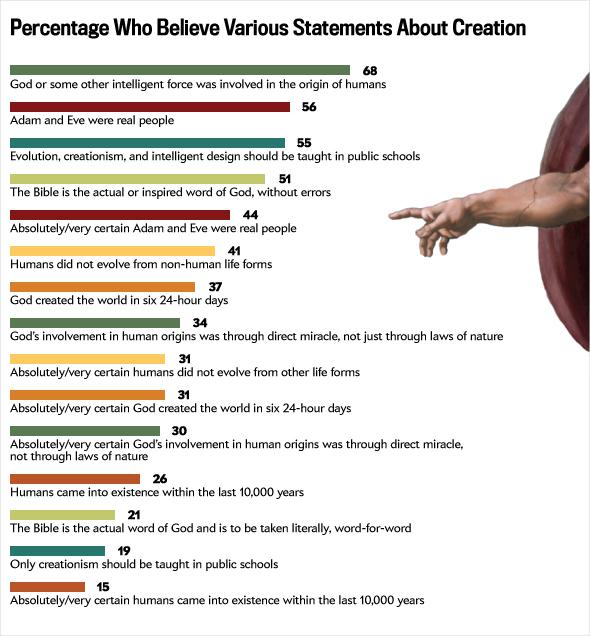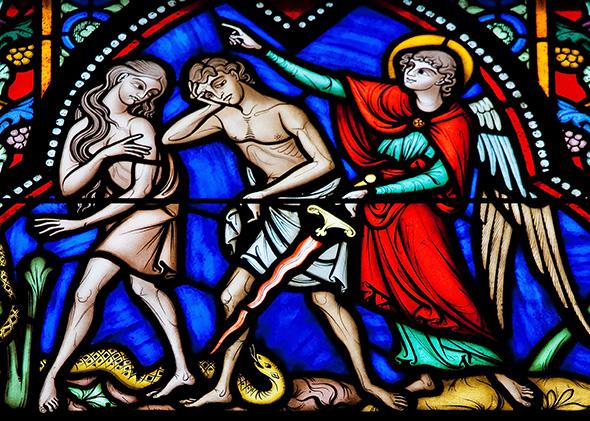In a dozen polls taken from 1982 to 2014, Gallup has asked Americans to choose among three views of evolution. One view is that humans “developed over millions of years from less advanced forms of life, but God guided this process.” Another view is that humans “developed over millions of years from less advanced forms of life, but God had no part in this process.” The third option is that “God created human beings pretty much in their present form at one time within the last 10,000 years or so.”
In that three-decade span, the young-Earth creationist option has always been the most popular choice. The percentage of respondents who affirm it has never fallen below 40. These findings, along with similar poll numbers, often alarm scientists, journalists, and educators. Nearly half of Americans, if not more, seem to be hardcore creationists.
But they aren’t. A new study, sponsored by the BioLogos Foundation and conducted by Calvin College sociologist Jonathan Hill, explores beliefs about evolution and creation in greater detail. The results show far more nuance, variation, and doubt than is commonly supposed. Most Americans do believe God created us. But the harder you press about historical claims in the Bible, the less confident people are. The percentage who stand by young-Earth creationism dwindles all the way to 15 percent.
The survey, taken last summer and released on Tuesday, asked more than 3,000 people a range of questions about human origins. At Slate’s request, Hill provided detailed data and cross-tabulations on several questions. We’ve lined up the numbers here, from the most to least popular statements, to show how the poll numbers decline as you press people about their confidence in specific aspects of creationism.
Let’s start with the number at the top. When Americans are asked whether “God (or some other intelligent force) was involved in any way with the origin of humans,” two-thirds say yes. But when they’re asked to choose among three versions of this divine role—“direct involvement by miraculously creating humans,” “direct involvement but through the ordinary laws of nature,” or “indirect involvement by creating the laws of nature which led to the emergence of humans”—only half choose the “direct involvement” version. And when these people are asked about their level of certainty, the percentage who say they’re “absolutely” or “very” certain about a direct role drops to 30. (The next option below “very certain” was “somewhat certain.” Saying you’re only somewhat certain is basically a way of saying you’re not certain.)

Chart by Slate/Arm by iStock
The next most popular statement was that “Adam and Eve, the first humans according to the Bible, were real, historical people.” Fifty-six percent of respondents affirmed this statement. But when they were pressed, only 44 percent said they were absolutely or very certain about it. A majority became a minority.
When people were asked whether evolution, creationism, intelligent design, or “some combination” of them should be taught in public schools, only 18 percent said evolution should be taught exclusively. A majority, 55 percent, preferred “some combination.” But these people are pluralists, not absolutists. Only 19 percent of respondents said that creationism—the theory “that biological life was directly created by God in its present form at one point in time”—should be taught exclusively.
My favorite question is about scriptural interpretation. The survey asked:
Which of the following comes closest to your personal beliefs about the Bible?
1. The Bible is the actual word of God and is to be taken literally, word-for-word.
2. The Bible is the inspired word of God, without errors, but some parts are meant to be symbolic.
3. The Bible is the inspired word of God and contains some factual or historical errors.
4. The Bible is not inspired by God but tells how the writers of the Bible understood the ways and principles of God.
5. The Bible is just another book of teachings written by men containing stories and advice.
Two-thirds of respondents selected one of the top three options. These people affirmed, in one form or another, that the Bible is God’s word. A majority, 51 percent of the entire sample, picked one of the top two options. But only 21 percent agreed that everything in the Bible is literally true. Thirty percent chose the second statement: that the Bible is “without errors” but that “some parts are meant to be symbolic.” This isn’t what secular people tend to think inerrancy means. But it is what a lot of Christians apparently believe. Most people who believe that the Bible is inerrant do not believe that this means everything in it is literally true.
By the time you get to specific denials of evolution—whether “humans evolved from non-human life forms” and whether “God created the world in six 24-hour days”—the percentage who take positions incompatible with scientific evidence drops to 41 and 37 percent, respectively. Only 30 percent of people are absolutely or very certain that God created the world in six 24-hour days, that God created humans through a direct miracle, or that humans didn’t evolve from other life forms. When you ask about the age of the Earth, resistance drops further. Only 26 percent of Americans say that “humans came into existence sometime in the last 10,000 years.” (The rest say that we’re older or that they’re not sure.) And only 15 percent are absolutely or very confident about young-Earth creationism.
How many people are truly hardcore creationists? For that, you have to look at certainty across a range of statements. Hill’s data show a high correlation in responses to four propositions: that God created the world in six 24-hour days, that God created humans miraculously, that humans didn’t evolve from other life forms, and that Adam and Eve were real people. Sixteen percent of respondents said they were absolutely or very certain about all four of those beliefs. That’s the hardcore. And even that core isn’t as hard as advertised. Ask whether humans have been around for only 10,000 years, and the hardcore—those who are absolutely or very certain on all five questions—shrinks to 7 percent.
Yes, we’re a creationist country. But apparently, we’re pretty creative about what that means.
